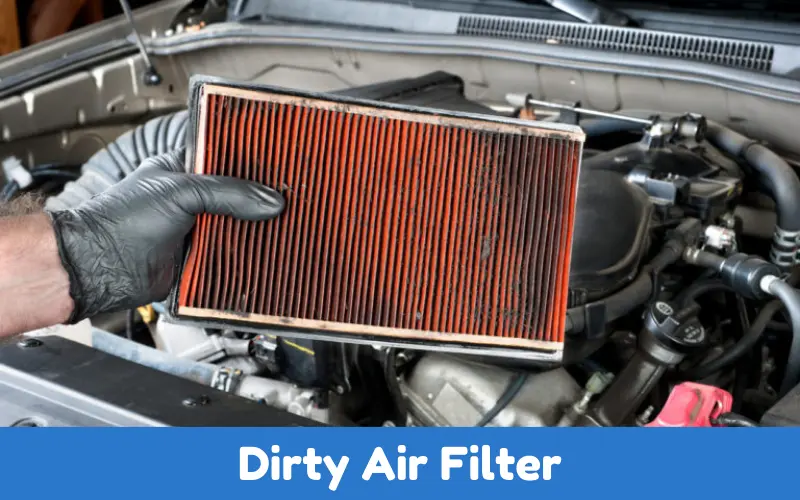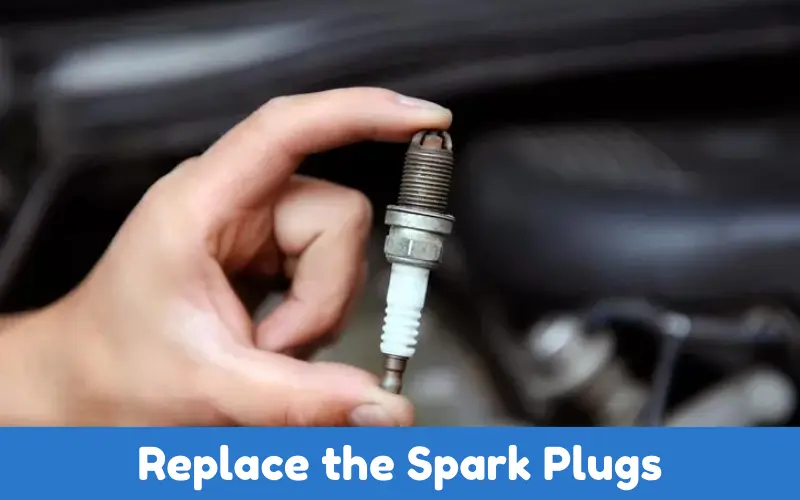Car chugging is a very common problem, and it could be caused by several minor and major reasons that need immediate repair.
Knowing why is my car chugging helps you to fix the issues as soon as possible, thus keeping your vehicle in good shape and saving you the cost of expensive repairs.
Today’s blog post explains the most common reasons for car chugging and how you can solve the problem of having your car running smoothly.
Topic Summary
7 Reasons Why is My Car Chugging
Your car might chug for a number of reasons, most of which generally apply to its engine, fuel system, or exhaust. On this page are the most common problems you might notice when your car chugs.
1. Fuel System Problems
The fuel system ensures that the right amount of fuel gets to the engine and is mixed with air before combustion. When it fails, your car starts to chug, especially when you try to accelerate.
Dirty Fuel Injectors: The fuel injectors may be clogged with dirt and debris, leading to an uneven fuel flow pattern, affecting your engine, and triggering a hesitation or chugging. This can be avoided by maintenance and fuel injector cleaning.
Faulty Fuel Pump: When a fuel pump fails, it won’t supply enough fuel to the engine, which may cause the chugging sound. If you detect this problem, it’s a good time to have a fuel pump checked or replaced.
Dirty Fuel: Water or other substances in fuel prevent efficient combustion, leading to a rough engine when you give it throttle.
You can avoid this by using premium quality fuel and changing your fuel filter as your owner’s manual recommends.
2. Ignition System Issues
This makes it belong to the ignition system, which ignites the air fuel mixture in the engine. If some part of the system is not working, chugging might result.
Worn-Out Spark Plugs: A misfire (from deteriorated or fouled spark plugs, for instance) can result in an uneven or chugged engine, so be sure to replace plugs as frequently as your car requires.
Bad Ignition Coils: Each spark plug needs about 27,000 volts of electricity to fire, which is provided by an ignition coil.
The coils themselves can go bad, causing the spark to drop, causing your chug. With a simple test and replacement, this dilemma may be over.
3. Air Intake Problems
When the engine draws the right proportion of airliners, the mixture is correct. A hiccup in the air intake leads to chugging.
Dirty Air Filter: A dirty air filter restricts airflow, which impairs engine combustion and causes chugging. Changing your air filter regularly allows the engine to take in the proper amount of air to run its best.

Faulty Mass Air Flow (MAF) Sensor: The mass air flow sensor measures the air entering the engine. A defective sensor can send an incorrect reading, leading to a fuel supply that is too high or too low.
If the sensor sends too little, it can cause the car to stutter or chug. Sometimes, you can clean the sensor, which will solve the problem. Other times, the sensor needs to be replaced entirely.
4. Exhaust System Problems
The exhaust system takes the engine’s gases away. Choking or leaking can cause chugging.
Clogged Catalytic Converter: Increased back pressure from a clogged converter will cause the engine to chug. If the fault is suspected, the catalytic converter should be inspected.
Exhaust Leak: Small leaks in the exhaust system can affect performance by causing a chug and, if not addressed, can cause severe damage.
5. Transmission Issues
However, less frequently, transmission issues can also cause chugging in your car, particularly when shifting gears.
Slipping Transmission: If your transmission is slipping due to low fluid or an ailing valve body, chugging can also result because the engine’s power isn’t able to get to the wheels efficiently.
If you encounter any of these issues, you should have your transmission looked at by a professional repair shop immediately.
6. Vacuum Leaks
Vacuum leaks can cause the air fuel mixture to be too lean or too rich, causing the engine to chug significantly when accelerating.
Correcting a vacuum leak will bring the engine back to its smooth state.
7. Engine Timing Issues
The engine can chug or just be nasty to drive if the timing belt is broken or the chain is loosened or off by a tooth or two. Gaskets and timing components.
Checking and staying on top of these can prevent the rattle behind the dash. I would not recommend anyone driving in my environment.
What Should You Do If Your Car Chugging?
Don’t wait to diagnose a chugging car. Continued use puts more wear and tear on pistons, push rods, valves, and other components, which leads to further damage that is costly to repair.
As an expert on car performance, here is what you can do now.
Check Your Warning Lights: If your check engine light is on, have the error codes read by a mechanic to help determine what is wrong.
Perform Routine Maintenance: Have fuel filters, air filters, spark plugs, etc, replaced per your vehicle’s maintenance schedule.
Inspect the Fuel and Ignition Systems: Have a mechanic inspect your fuel injectors, pump, and ignition system.
Get Them To Fix It: If you don’t know the cause, visit an auto repair shop with a trustworthy mechanic who can diagnose and correct the fault.
Thus, handling the chugging problem early on will prevent your car from breaking down further. Once symptoms start appearing, regular maintenance and immediate action are necessary to maintain your car’s condition and prolong its lifespan.
How To Fix Car Chugging
If you want to fix a car that is chugging, you need to determine why it is chugging so that you can fix that problem.
Here is a guide to the most common causes of car chugging and how to troubleshoot and repair them.
Check the Fuel System
Check Fuel Injectors: Clean them with an injector cleaner, or have them cleaned or replaced by a professional if the issue is more significant.
Check the Fuel Pump: If the pump isn’t working, get the mechanic to test it. If insufficient fuel is being delivered, it might need replacing.
Check for Contaminated Fuel: Drain and test the fuel tank for contaminated fuel. Remove and replace the fuel filter. Pour the drained fuel into a clear bottle or jar.
Shake vigorously and allow to settle for one minute. If more than a quarter of the volume forms a white sediment or gel at the bottom, your fuel is contaminated.
Examine the Ignition System
Replace the Spark Plugs: Look for any signs of wear or fouling on the spark plugs. If they are deteriorated or old, replace them with the correct ones as indicated in your vehicle’s manual.

Test Ignition Coils: Your car comes equipped with two or four ignition coils (for V6 and V8 engines).
Use an ignition coil tester to identify a failing coil. In that case, replace it to enable proper ignition operation.
Inspect the Air Intake System
Replace Air Filter: A dirty air filter can restrict the engine’s air supply. You should replace the filter if it looks grimy or has been replaced for a long time.
MAF Sensor: If the Mass Air Flow (MAF) sensor is coated with dirt, it can signal false data to the ECU, causing the engine to rev high, although you’re cruising steadily.
You can clean the MAF sensor by spraying it with an MAF Sensor Cleaner or replacing it.
Check the Exhaust System
Check the Catalytic Converter: Back pressure caused by a clogged catalytic converter can cause chugging. If necessary, it’s best to have it replaced.
Repair Exhaust Leaks: If you notice a hissing sound or see that exhaust discharges are leaking, take your truck to a certified mechanic immediately and have them repaired. The engine may not run properly when there are exhaust leaks.
Look for Vacuum Leaks
Inspect Hoses: Check all vacuum hoses for cracks or disconnections. Replace cracked or disconnected hoses to restore vacuum pressure to the engine.
Vacuum Leak Detector: This device uses a degassed can and a ‘smoke’ syringe to find leaks in inaccessible areas and seal all leaks detected during inspection.
Check Engine Timing
Check the Timing Belt or Chain: Worn or out of time belts and chains can cause the engine to chug. Have it checked, and replace the belt if necessary.
Address Transmission Issues
Check Transmission Fluid: Low or dirty transmission fluid can cause chugging. Check the fluid level and quality and refill as appropriate.
Take It To a Transmission Specialist: This would apply if you were having problems with slipping or failing to shift gears.
Check for Warning Lights
Read Error Codes: If the Check Engine Light is on, scan the vehicle with an OBD-II scanner and go to the trouble code. Often, this code will be pretty specific about which thing is choking us off.
Regular Maintenance
Keep Up with Routine Maintenance: Change your vehicle’s fluids, filters, and other components regularly per the manufacturer’s schedule to help prevent many causes of chugging.
When To Seek Professional Help
After trying these suggestions, you may find your car still running ‘roughly.’ If this is the case, then it is time to take your vehicle to a reputable mechanic.
They will be able to conduct a more thorough diagnostic than I could, using the appropriate equipment available to them, and get your engine running smoothly.
This helps prevent more severe damage later and maintains your car’s health. Paying attention to regular maintenance and unusual symptoms will keep your vehicle running smoothly and allow you to enjoy driving it for a long time.
Is Car Chugging a Severe Problem?
You can start, but car chugging should be addressed for some reasons. It often represents a breakdown of sensitive components like the combustion engine, gearbox, or fuel system.
For example, spark plug wires might be malfunctioning, fuel injectors could be clogged, a transmission might have problems, and a host of other things could be wrong.
Unless we address the symptoms, issues will likely worsen until we are forced to pay a lot of money to fix the parts or (much later) fix the whole car.
In other words, the jerking during car use must be handled for your vehicle to work correctly and still be safe to drive.
If the jerking becomes apparent and continues over time, seek the help of qualified mechanics to promptly prevent or find a solution.
FAQs About Why is My Car Chugging
What Does It Mean Why My Car is Chugging?
Chugging while driving is generally the same motion, rough idling, or jerking that occurs when the engine doesn’t rotate smoothly. It most often indicates a problem with fuel, ignition, air intake, or exhaust.
Can I Continue Driving If My Car is Chugging?
You could still take your chugging car to the next store down the road, but it’s a bad idea. You’ll just add wear and tear to your vehicle if you drive it when it’s sucking, and you’ll end up having to pay more to get it fixed later on. The best thing to do is to take your car in to get it checked out and get the problem diagnosed and fixed as soon as possible.
What Are the Common Causes of Car Chugging?
The most common reasons are dirty fuel injectors, spark plugs or a clogged air filter, exhaust systems problems such as a blocked catalytic converter, and vacuum leaks. Transmission or engine timing issues could also cause chugging.
How Much Does It Cost To Fix a Chugging Car?
From minor misfires (a wobbling rhythm) to severe backfiring (a spray of flames), the repair might cost as little as $50 to $100 for a new set of spark plugs and air filters, to well into the several hundreds of dollars for a defective fuel pump or several thousand for a replacement catalytic converter.
How Can I Prevent My Car from Chugging?
Regular maintenance can prevent chugging in the car, such as replacing spark plugs, air filters, and fuel filters on time. The fuel octane, engine timing, and exhaust and transmission problems should also be fixed in time. We need to go to the mechanic for a regular checkup.
Conclusion
Early intervention is the most important action needed to prevent the car from chugging. This will keep your car in excellent working order and save you from costly repairs further down the track.
You can prevent chugging by being aware of some common causes, such as malfunctioning fuel, ignition, air intake to the engine, and exhaust systems.
Taking the vehicle in for regular service and prompt repairs will keep it in good condition for a smoother, safer road ride.

